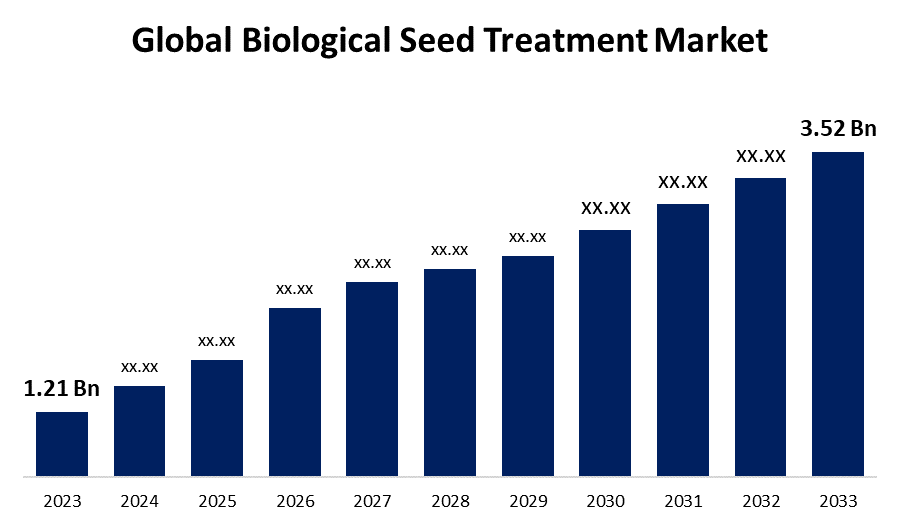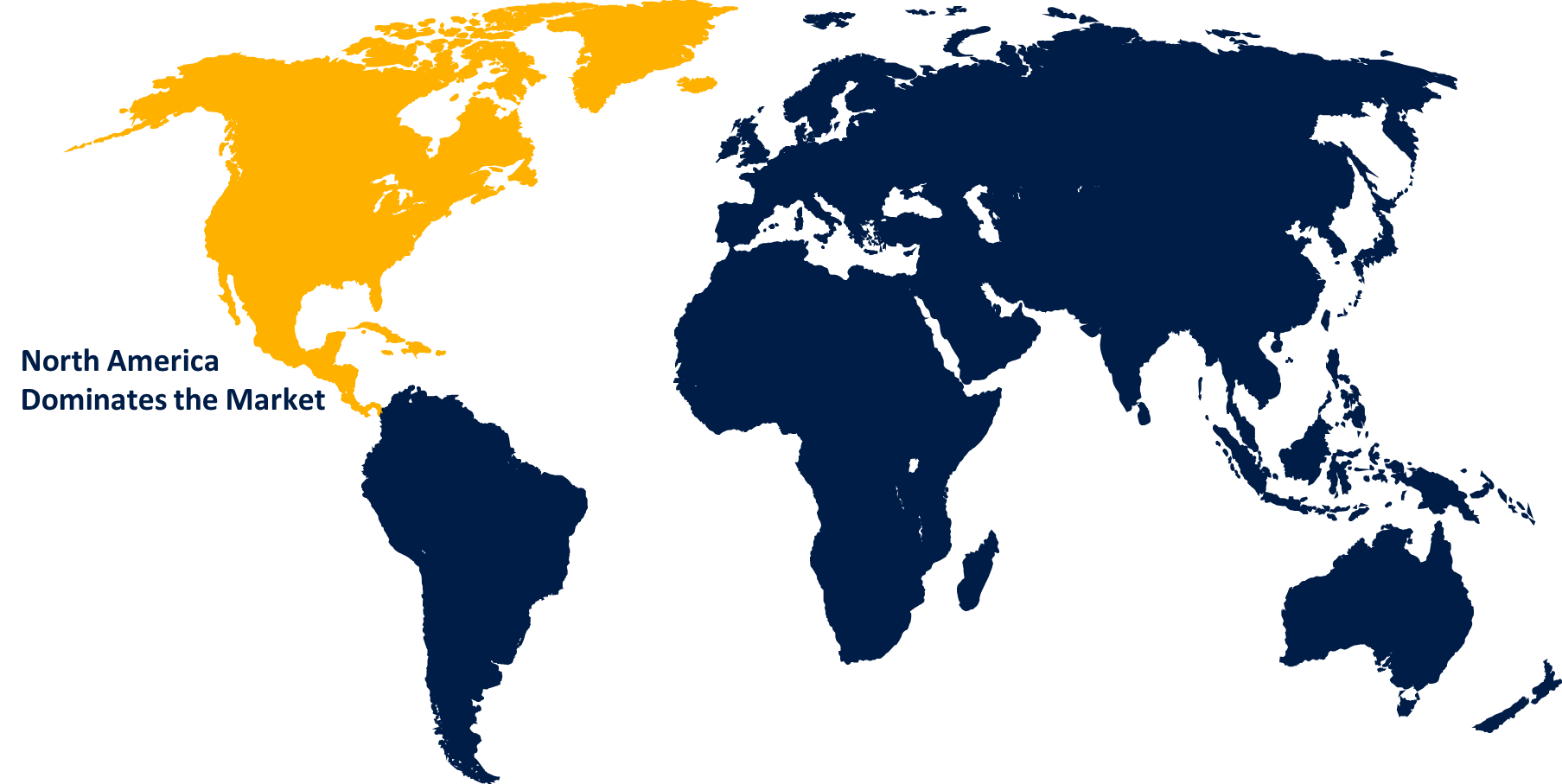Global Biological Seed Treatment Market Size, Share, and COVID-19 Impact Analysis, By Type (Microbial and Botanical), By Crop Type (Cereals and Grains, and Fruits and Vegetables), By Function (Seed Protection and Seed Enhancement), and By Region (North America, Europe, Asia-Pacific, Latin America, Middle East, and Africa), Analysis and Forecast 2023 - 2033.
Industry: AgricultureGlobal Biological Seed Treatment Market Insights Forecasts to 2033
- The Global Biological Seed Treatment Market Size was Valued at USD 1.21 Billion in 2023
- The Market Size is Growing at a CAGR of 11.27% from 2023 to 2033
- The Worldwide Biological Seed Treatment Market Size is Expected to Reach USD 3.52 Billion by 2033
- Asia Pacific is Expected to Grow the fastest during the forecast period.

Get more details on this report -
The Global Biological Seed Treatment Market Size is Anticipated to Exceed USD 3.52 Billion by 2033, Growing at a CAGR of 11.27% from 2023 to 2033.
Market Overview
Biological seed treatment contains active components such as fungus, bacteria, plant extracts, algae extracts, and others. Biological seed treatment contains microorganisms utilized for preventing seeds towards seed and soil-borne diseases, hence this is the most appropriate solution to the chemical solutions. They are available in liquid and powder forms. Biological seed treatment attempts to guarantee that the goods are evenly coated on the surface of the seeds. Biological seed treatment serves as a biostimulant on crops, causing them to become healthier and grow faster. They also help increase crop yields by reducing biotic stress and strengthening the immune system to combat plant diseases. The application of biological seed treatment aids in the uptake and availability of plant nutrients in the roots of the plants. It also aids microorganisms in colonizing roots, so protecting the plants' roosts. The use of biological seed treatment decreases reliance on agrochemicals, lowering chemical exposure and minimizing environmental effects. All of these reasons contribute significantly to the global growth of biological seed treatment.
Report Coverage
This research report categorizes the market for the global biological seed treatment market based on various segments and regions forecasts revenue growth and analyzes trends in each submarket. The report analyses the key growth drivers, opportunities, and challenges influencing the global biological seed treatment market. Recent market developments and competitive strategies such as expansion, product launch, and development, partnership, merger, and acquisition have been included to draw the competitive landscape in the market. The report strategically identifies and profiles the key market players and analyses their core competencies in each sub-segment of the global biological seed treatment market.
Biological Seed Treatment Market Report Coverage
| Report Coverage | Details |
|---|---|
| Base Year: | 2023 |
| Market Size in 2023: | USD 1.21 Billion |
| Forecast Period: | 2023-2033 |
| Forecast Period CAGR 2023-2033 : | 11.27% |
| 2033 Value Projection: | USD 3.52 Billion |
| Historical Data for: | 2019 - 2022 |
| No. of Pages: | 240 |
| Tables, Charts & Figures: | 110 |
| Segments covered: | By Type, By Crop Type, By Function, By Region |
| Companies covered:: | BASF SE, Bayer AG, Syngenta, Loveland, DuPont, Valent BioSciences LLC, Verdesian Life Sciences, Plant Health Care plc., Precision Laboratories, LLC, Koppert Biological Systems, Italpollina S.P.A, Croda International Plc, Corteva Agriscience, Novozymes A/S, Agrauxine by Lesaffre, and Others |
| Pitfalls & Challenges: | Covid 19 Impact Challanges, Future, Growth and Analysis |
Get more details on this report -
Driving Factors
The demand for biological seed treatment has increased dramatically as a result of widespread recognition of its advantages and growing concern about the environmental and health concerns connected with traditional chemicals. Chemical seed treatments are harmful to the ecosystem and constitute a significant threat to pollinators. Honeybees are considered to be extremely sensitive to neurotoxic insecticides. In comparison to synthetic chemicals, microorganisms used as active substances in pest management are typically harmless to the environment and non-target organisms. The biological seed treatment application in agricultural practices has greatly expanded due to its benefit in controlling diseases and infections that are soil- and seed-borne. Product considerations started to dominate chemical treatment as the demand for sustainable agriculture grew and the chances of surpassing residue constraints were reduced. Additionally, it is expected that the growing popularity of organic farming will have a direct effect on the income generated by the global biological seed treatment market.
Restraining Factors
A drawback of biological seed treatments is their higher cost compared to chemical seed treatments. Biological seed treatment expenses are higher per acre as compared to chemical seed treatment due to chemical seed treatment and seeds are manufactured in large quantities, lowering their cost per unit. Although biological seed treatment is more environmentally friendly, its protection is less long-lasting than chemical seed treatment. Furthermore, restrictions differ by region, making it difficult for producers to introduce the product. As a result, the reasons discussed above have a negative impact on the growth of the global biological seed treatment market.
Market Segmentation
The global biological seed treatment market share is classified into type, crop type, and function.
- The microbial segment is expected to dominate the global biological seed treatment market during the forecast period.
Based on the type, the global biological seed treatment market is divided into microbial and botanical. Among these, the microbial segment is expected to dominate the global biological seed treatment market during the forecast period. These treatments use helpful microorganisms including bacteria, fungus, and viruses. They offer various advantages, including disease management, increased nutrient availability, and increased plant development. Microbials are frequently used because of their ability to protect seeds and seedlings from infections and pests.
- The cereals and grains segment is expected to dominate the global biological seed treatment market during the forecast period.
Based on the crop type, the global biological seed treatment market is divided into cereals and grains, and fruits and vegetables. Among these, the cereals and grains segment is expected to dominate the global biological seed treatment market during the forecast period. Crops in this group are wheat, corn, rice, barley, and many more. Biological seed treatments for grains and cereals mainly aim at enhancing seed germination, disease resistance, absorption of nutrients, and crop yield.
- The seed protection segment is expected to hold the largest share of the global biological seed treatment market during the forecast period.
Based on the application, the global biological seed treatment market is divided into seed protection and seed enhancement. Among these, the seed protection segment is expected to hold the largest share of the global biological seed treatment market during the forecast period. In the early stages of seedling development, biological seed treatments to protect seeds offer focused management of specific pests and fungal diseases. Many crops are treated with biological seed treatments to manage various kinds of pests. It promotes consistent stand establishment by protecting against a variety of soil-borne diseases and insects.
Regional Segment Analysis of the Global Biological Seed Treatment Market
- North America (U.S., Canada, Mexico)
- Europe (Germany, France, U.K., Italy, Spain, Rest of Europe)
- Asia-Pacific (China, Japan, India, Rest of APAC)
- South America (Brazil and the Rest of South America)
- The Middle East and Africa (UAE, South Africa, Rest of MEA)
North America is anticipated to dominate the global biological seed treatment market over the predicted timeframe.

Get more details on this report -
North America is anticipated to dominate the global biological seed treatment market over the predicted timeframe. The increased demand from both domestic and international markets for high-yielding and disease-tolerant crops is responsible for the sector's notable market share. Furthermore, components that include a systematic distribution chain for crop protection chemicals, the availability of water and land, entrepreneurial farmers, rising awareness of sustainable crop production techniques to reduce the impact on the environment, and the involvement of plenty of stakeholders all contribute to the development of this market in the region. Furthermore, growing agronomic trends, such as the development of high-quality seeds due to the increased potential offered by genetically modified organisms (GMOs), shifts in climatic conditions, versatility in sowing methods, and increased regulatory pressure, all contribute to the growth of this regional market. The strong agricultural industry in North America, together with significant technology improvements and government policies that promote sustainable practices, plays a role in the region's Biological Seed Treatment Market growth. The use of modern technology and biological seed treatments is effective in increasing crop productivity, boosting plant health, and lowering reliance on chemical pesticides.
Asia Pacific is expected to grow at the fastest rate in the global biological seed treatment market during the forecast period. The APAC region, which includes China, India, and Japan, has a fast-rising biological seed treatment industry. In APAC, the dominant segments differ depending on each country's agricultural techniques and crop preferences. For instance, soybeans and rice are two popular crops in China that benefit from biological seed treatment. The growing adoption of organic agricultural practices, combined with increased awareness of sustainable agriculture, is driving demand for biological seed treatment in the region. Furthermore, government measures supporting environmentally friendly agricultural techniques, as well as an increased emphasis on food safety, help to drive market expansion.
Competitive Analysis:
The report offers the appropriate analysis of the key organizations/companies involved within the global biological seed treatment market along with a comparative evaluation primarily based on their product offering, business overviews, geographic presence, enterprise strategies, segment market share, and SWOT analysis. The report also provides an elaborative analysis focusing on the current news and developments of the companies, which includes product development, innovations, joint ventures, partnerships, mergers & acquisitions, strategic alliances, and others. This allows for the evaluation of the overall competition within the market.
List of Key Companies
- BASF SE
- Bayer AG
- Syngenta
- Loveland
- DuPont
- Valent BioSciences LLC
- Verdesian Life Sciences
- Plant Health Care plc.
- Precision Laboratories, LLC
- Koppert Biological Systems
- Italpollina S.P.A
- Croda International Plc
- Corteva Agriscience
- Novozymes A/S
- Agrauxine by Lesaffre
- Others
Key Target Audience
- Market Players
- Investors
- End-users
- Government Authorities
- Consulting And Research Firm
- Venture capitalists
- Value-Added Resellers (VARs)
Recent Developments
- In March 2024, Loveland Products announced Equity VIP, an emerging seed treatment specifically designed for soybeans.
- In October 2023, BASF SE introduced Poncho Votivo Precise seed treatment that prevents crops from insect and worm infestations and attempts at increasing soybean growth output potential.
Market Segment
This study forecasts revenue at global, regional, and country levels from 2020 to 2033. Spherical Insights has segmented the global biological seed treatment market based on the below-mentioned segments:
Global Biological Seed Treatment Market, By Type
- Microbial
- Botanical
Global Biological Seed Treatment Market, By Crop Type
- Cereals and Grains
- Fruits and Vegetables
Global Biological Seed Treatment Market, By Application
- Seed Protection
- Seed Enhancement
Global Biological Seed Treatment Market, By Regional
- North America
- US
- Canada
- Mexico
- Europe
- Germany
- Uk
- France
- Italy
- Spain
- Russia
- Rest of Europe
- Asia Pacific
- China
- Japan
- India
- South Korea
- Australia
- Rest of Asia Pacific
- South America
- Brazil
- Argentina
- Rest of South America
- Middle East & Africa
- UAE
- Saudi Arabia
- Qatar
- South Africa
- Rest of the Middle East & Africa
Need help to buy this report?